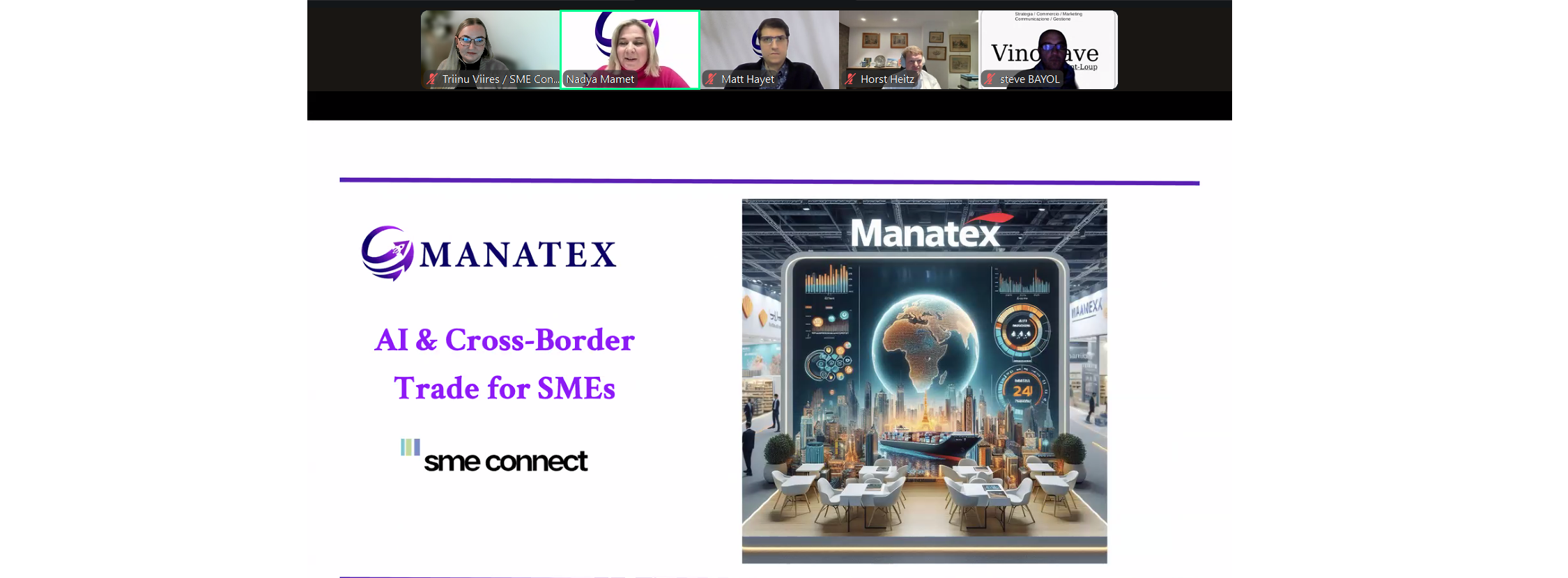AI & Cross-Border Trade for SMEs:
How Artificial Intelligence Can Drive International Growth

Across Europe, many small and medium-sized enterprises continue to face significant challenges when expanding cross-border. Limited internal resources, fragmented information, and increasingly complex international conditions often prevent them from scaling abroad. At the same time, AI adoption among SMEs remains limited, even though the technology offers practical tools that can drastically reduce uncertainty and improve export outcomes.
To explore these opportunities, SME Connect’s Working Group on Artificial Intelligence, Data Economy and Cybersecurity together with Manatex, a European AI-driven export platform, organised the webinar “AI & Cross-Border Trade for SMEs: How Artificial Intelligence Can Drive International Growth.” The session was opened by HORST HEITZ, Chair of the SME Connect Steering Committee, who highlighted the dual transformation facing SMEs: accelerating global competition and rapid technological change. While large corporations already integrate AI into their strategies, SMEs often lack the skills, tools, or confidence to do the same.
Following the introduction, NADYA MAMET, Co-Founder and Director of Business Development and Marketing at Manatex, presented the structural reasons why SMEs struggle with international growth. Drawing on decades of experience, she explained that many firms base their export decisions on intuition or incomplete data rather than systematic analysis. “SMEs too often go abroad with intuition, not insights — without structured data on market demand, pricing, competition or regulatory barriers, international expansion becomes a gamble rather than a strategy.” Nadya showed how misjudged competitiveness, underestimated costs, and insufficient preparation frequently lead to failed expansion attempts, and how AI can address these issues by analysing vast datasets to produce clear guidance on market potential and risks.
MATT HAYET, Co-Founder and CEO of Manatex, expanded on how AI can be embedded into the daily operations of SMEs. He distinguished between general-purpose AI tools and expert AI systems designed for accurate trade and export analysis. “Effective export decisions demand expert AI, not generic chatbots — only domain-specific systems trained on trade and export data can reliably guide market selection, risk assessment and pricing for SMEs.” Matt explained that export planning requires AI built specifically around trade logic and market signals, and demonstrated how SMEs can use AI-driven workflows to increase productivity and make complex market analysis accessible without large teams.
The session also underscored both the promise of AI and the barriers that still limit SME adoption, including concerns about complexity, trust and cost. Throughout the presentations, it became clear that accessible, user-friendly solutions and continued European support will be essential for enabling smaller firms to work confidently with new digital tools. AI’s ability to reduce export risks by guiding market choice, preventing costly mistakes and simplifying regulatory navigation emerged as a central theme.
The webinar concluded with a shared understanding that artificial intelligence represents a major opportunity for European SMEs that want to strengthen their global presence. Platforms like Manatex show how AI can democratise internationalisation, allowing even the smallest companies to make informed decisions, reduce uncertainty and expand abroad with greater confidence.
Get free Manatex test account here.